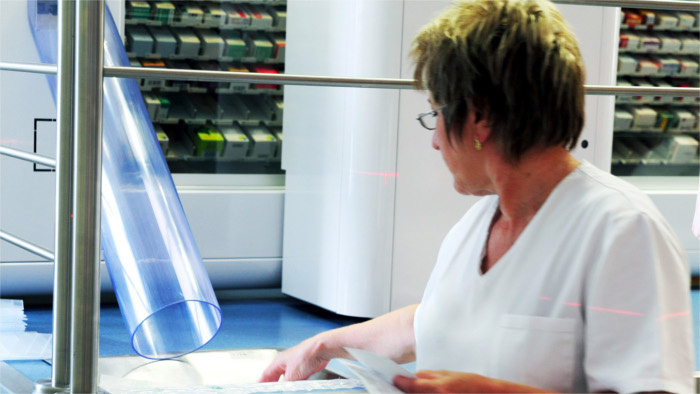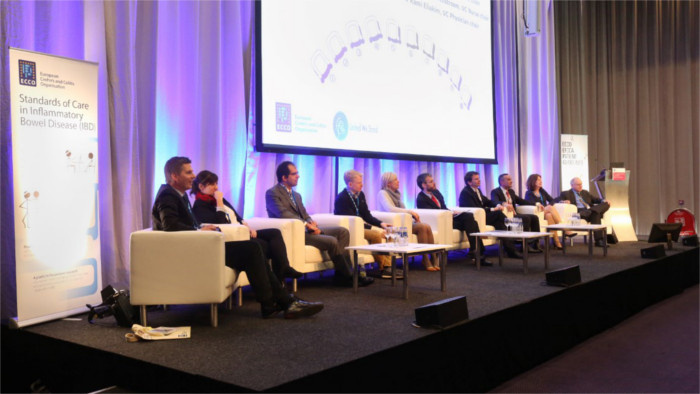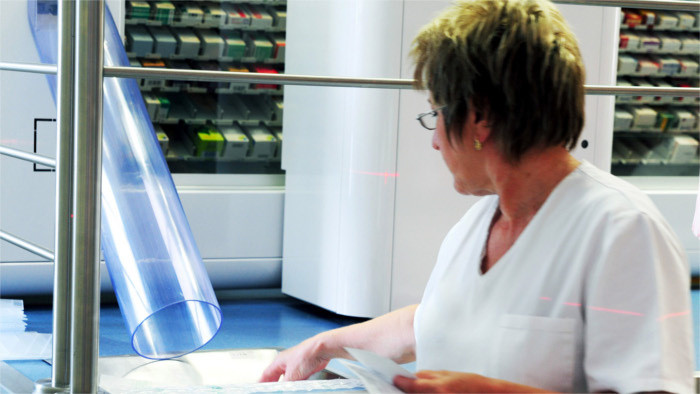The doctor is king in Slovakia; a country which still very much represents "one of those old-style prescription-driven markets" where patients tend to strictly follow the recommendations of their physician- or so say the managers of pharmaceutical companies doing business in Slovakia surveyed by the trade magazine Pharma Boardroom last year. As a consequence, the managers add, the pharma industry has to be "especially attentive to building and maintaining close relations with the local medical community". What does it mean and who should keep an eye on these close relations?
As of last year, all pharmaceutical companies including pharmacies and distribution companies, are obliged by law to report the amount of money they invested in marketing, promotion of particular drugs and also in the healthcare personnel who in return are obliged to include these funds in their annual tax report. Doctors, nurses, pharmacists and laboratory personnel can receive funds from the pharma industry for conducting clinical trials, doing market research, producing studies, attending conferences and seminars and of course in the form of speaking fees. The data is collected and made public by the National Centre for Healthcare Information which two weeks ago released the first updated report covering the first half of 2016. It shows that the total amount spent on marketing reached 19.05 million euro with 12.1 million euro spent specifically on promoting drugs. The biggest spender is GlaxoSmithKline. In the same period pharmaceutical companies paid about 1.09 million euro in speaking fees to doctors some of them even reaching the level of a monthly average salary of a specialist per lecture. Another 1.2 million euro went to covering conference fees and accommodation and travel costs to doctors and nurses attending expert events.
"We have suspected that there were some very intensive relations between such companies and healthcare personnel and in the attempt to introduce more transparency we have supported the initiative to collect and make public as much of such data as possible. I think patients have the right to know that their doctor cooperates with a particular drug maker and if they have questions related to this topic to openly discuss it," says Nikola Gurgoľová, the Project Manager for Healthcare at the watchdog Transparency International Slovakia which had run a pilot project in this respect called „Transparent doctors" with the support of four big pharmaceutical companies and the second largest Slovak insurance company. Both the Association of Innovative Pharmaceutical Companies (AIFP) and that of producers of generic drugs (GENAS) publicly praise the rules on cooperation disclosure as part of the wider, international strategy of the pharmaceutical industry to improve its image after big corruption scandals shaking some of the biggest names in the business from GlaxoSmithKline, Novartis to Teva Pharmaceuticals which are members of these two associations. "At the European level we have very strict and clear rules which became part of our own ethical codex and which encourage transparency in the relationship with doctors, patients organisations, decision makers and so on. If they are breached by our members they risk a fine of 7,000 euro for the first breach and up to 20,000 euro in case it happens again. So far we do not have any reports of unethical behaviour from our members in Slovakia. Of course we are aware of the fact that bad news from our sector worldwide resonates in Slovakia among both patients and doctors, " says Katarina Slezáková, the Executive Director of Association of the Innovative Pharmaceutical Industry.
Many provisions from this ethical codex were included into Slovak law. Even if it has been in practice since 2015, there were plenty of examples of events supported by association's members, for example in ski and golf resorts, while the codex says such localities should be avoided or with the offer of recreational activities higher up in the programme than the abstracts of experts' presentation. As of this summer these will be the things of the past according to the AIFP's leadership. One could not stop noticing the irony that an online course teaching how to report and tax the funds from pharmaceutical companies for which Slovak doctors can get credits is supported by Teva Pharmaceuticals which last year had to pay $519 million to settle charges of bribing officials and doctors in Russia, Ukraine and Mexico and faces similar accusations in other countries too. Both the course organisers and the Association of Producers of Generic Drugs (GENAS) to which Teva belongs see no problem in this as the company has not been accused of doing anything wrong in Slovakia. To be fair Teva's case is not the only example. GlaxoSmithKline which supported the „Transparent doctors" project has also had to deal with a $490 million fine for bribery in China in 2014 and investigations into allegations of bribing doctors to promote its products in other countries including Romania, opened in 2015 the year when its Slovak branch was signing up for an ethical codex in Slovakia. Another supporter of the „Transparent doctors" project, Novartis woke up last Wednesday with police at the door of their South Korean office suspecting that the Swiss pharmaceutical giant had provided illicit rebates to local doctors.
 (Illustration photo,TASR)
(Illustration photo,TASR)
Back to Slovakia: doctors have their own reasons not to be very enthusiastic about the law on disclosure of financial support from pharmaceutical companies. Zuzana Teremová, the vice-president of the Slovak Chamber of Doctors explains why: „By law doctors are obliged to continually educate themselves and accumulate 250 credits each five years. Attending conferences and seminars is part of this process, and we have noticed that after the law asking them to tax the financial support received from pharmaceutical companies came into force some began avoiding events which are sponsored by such companies."
Those dreaming of attending a high quality medical congress will either have to save money on their own for the attendance fees, accommodation and travel expenses which for some specialisations such as neurosurgery for example can cost a young doctor a sum worth even two monthly salaries or rely on the pharmaceutical industry's support even if it means they have to pay some money to the state coffers in taxes afterwards.
Ladislav Pásztor, the honorary President of the Association of Physicians with Private Practices says that many of his colleagues feel discriminated against by the current legislation. „Let's be serious, the pharmaceutical industry has very sophisticated ways of lobbying for its interests. Those ordinary doctors who attend conferences and seminars in Slovakia in order to get credits do not prescribe a particular drug just because its producer paid for their lunch. Most of them end up with having to fill in tax reports for hilarious small sums. The real lobby is done at the level of those who write the diagnosis and therapy guidelines - the chief medical experts, the members of the Health Ministry's commissions that decide on drugs' pricing and so on. In real life an ordinary doctor has to follow these guidelines and rules. "
Is anybody out there monitoring?
With Slovakia having a universal coverage system, where the mandatory contributions to the healthcare coffers are collected by three health insurance companies which then pay for treatment, it should not be difficult to follow the prescribing habits of doctors and detect potential irregularities. All three companies replied they regularly check it, only one detected some prescriptions issued without the knowledge of patients but could not establish a clear link between that particular oncologist and a pharmaceutical company.
Pásztor is not the only one hinting to the fact that the pharma industry is carefully choosing its targets for lobbying. Similar statements were made by two other top doctors, off the record. Now leaving the coverage for conference fees and travel and accommodation aside because in most cases these funds are not paid directly to the doctor, a look at the newly released data for the first half of last year shows that the majority of chief medical experts did receive very little- couple of hundreds of euro- or even no money at all from the pharmaceutical industry in speaking and consulting fees. Now the cash flows show a pattern according to which three of Health Ministry's medical chief experts made about ten thousand euro or more only in speaking and consulting fees paid by drug makers, and another three came only a couple of thousands of euro behind. This small group include people who at the same time are also high ranked members of professional medical associations and hold managerial positions in state run medical facilities too. I asked the Health Ministry who and how monitors the relations between these people and the pharmaceutical industry. I have not received an answer by the deadline but I will return to this topic in a future edition of „Slovakia Today".
Two other agencies which should watch out for potential conflicts of interests, the Public Health Agency and the Office for the Supervision of Healthcare Sector replied that they have internal rules which ask their employees and external consultants to disclose potential conflicts of interests. They say they have no information of any wrongdoings so far but it's unclear whether they actively monitor the situation or only wait for somebody to complain. One agency that tries to actively monitor the activity of pharmaceutical companies at conferences and other experts' events is the State Office for Drugs' Control. „By law we have to monitor the advertising and promotion activities for drugs at events which are sponsored by pharmaceutical companies and which are attended by doctors and pharmacists. There are clear rules on the fact that pharma sponsored presentations cannot count for more than 20 percent of the entire programme and does not count as time for credits for doctors. Also the content of those presentations or the accompanying events such as stands for example must not be misleading. We can apply fines to those breaching these rules,"says Diana Madaraszová the spokesperson of the State Office for Drugs' Control. She could not say, however, how many such fines her office has applied so far. It's a challenging task for an understaffed office to go and check the reality on the field so they too rely on waiting for somebody to complaint.
 (Illustration photo: European Crohn's and Colitis Organisation)
(Illustration photo: European Crohn's and Colitis Organisation)
Now the concentration of positions and activities on the hands of a few people makes the Slovak medical community look like a closed and strongly hierarchized one raising questions about how much place for independent and critically thinking it really has. Jozef Glasa, the vice-president of the Slovak Medical Society the umbrella organisation for almost all professional medical associations in this country who also lectures on ethics to future doctors offers the following explanation. "We are a small country, we do not have a lot of experts. Most of the diagnosis and therapy guidelines are anyway taken from the European and world level and adapted to the realities of the Slovak healthcare situation. In medicine it takes time to gain knowledge and experience to become an expert. Younger colleagues do not want to get actively involved with professional associations. I have to say openly that the medical community is in bad shape and we are faced with a shortage of doctors. "
Indeed, according to a study by the Finance Ministry's own Financial Policy Institute released in January each fifth graduate of a Slovak medical faculty left the country. In my discussions with some medical students over the past two years, the atmosphere in the Slovak healthcare was often mentioned as a cause of their discontent- the biggest wish being to be lucky to get a place in a ward led by a progressive doctor. Comfortable with modern technologies, they are eager to use them in their career - including for the so called continual education. But those staying in Slovakia will have to wait until the current system will be upgraded, a process which has started according to the Health Ministry. Katarina Slezáková the Executive Director of Association of the Innovative Pharmaceutical Industry says that pharmaceutical companies will always play a role in doctors' education: "The two sides naturally cooperate and interact with the common goal to find the best treatment for patients. Yes, we expect modern technologies to be more present in this process saving us troubles with how luxurious the venue of a conference can be and so on but doctors and pharmaceutical companies will always work together and believe me this cooperation is strictly regulated."
We only care about Slovakia
The Slovak daughters of multinational pharmaceutical companies are also active in supporting projects run by non-governmental organisations which deal with a wider range of hot issues in society including funding transparency projects. For many years Transparency International Slovakia has been running many projects on monitoring transparency in Slovakia's healthcare including the relations between doctors and pharmaceutical companies. Funds come from companies like GlaxoSmithKline, Novartis or Pfizer which have their own skeletons in the closet when it comes to corruption. Another non-governmental organisation the Pontis Foundation which acts as a grant agent for other organisations is in a similar situation. Ondrej Gallo the project manager of the Fund for Transparent Slovakia at the Pontis Foundation says that the three pharmaceutical companies Bayer, Pfizer and GlaxoSmithKline which support the fund should not be singled out for the image of their industry. "The fund was set up in 2013 by seven companies. Now we have 23. Members can decide who else to accept into the fund. We only check whether a particular company is linked with corruption scandals in Slovakia and the final decision always belong to the other members. We do not have the capacity to check on their activity in other countries. Pharmaceutical companies are not the only ones coming from a sector which has issues with corruption- we also have telecommunication operators," says Gallo
It's enough to check the news agencies or the website of the US Department of Justice for example to find information about corruption cases settlements or investigations into the practices of some pharmaceutical companies. I asked Gallo if he at least asks them about such issues. "We ask all our members how they behave on the market, it's a statement made on their own responsibility that they have not been involved in any corruption affair in Slovakia. We do not ask them about other countries. For us it's important how do they behave on the Slovak market. All the existing members are also members of the Business Leader Forum which have declared their support for social responsibility so they can monitor the behaviour on the market, the Slovak market. To avoid conflicts of interest, donors cannot decide which projects the fund supports and in which sectors; this is decided by an independent grant commission. We do not have any information from the organisations receiving funds that they would be unhappy that such donors from the pharmaceutical sector are there. Anyway the benefit for society outweighs the eventual question marks because you know how Slovak NGOs are struggling to fund their activities," says Gallo.
A similar idea that the result might be more important than the means comes from Transparency International too although its director Gabriel Šípoš is more cautious. "We have been faced with some tough decisions in this respect. We have decided for example to refuse money from the firm Penta which has a lot of investments in Slovakia's healthcare and has been involved in the famous Gorilla political corruption scandal. That's why we also stopped our cooperation with health insurer Dôvera which is owned by Penta. But these are tough decisions to make, " concluded Gabriel Šípoš , the head of the Transparency International Slovakia.
A complicated marriage
Máte problém s prehrávaním? Nahláste nám chybu v prehrávači.

